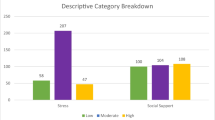Abstract
Although the Collegiate Recovery Community is increasingly seen as the treatment modality of choice for students in recovery, relatively few such programs have been established on small residential campuses. In this article we examine the possible reasons for this reluctance and suggest ways in which the standard model for a Collegiate Recovery Community, as represented by its three benchmark programs, can be modified and adapted to better fit the small residential campus environment. We summarize the problem and review the concept of a Collegiate Recovery Community, and we then explain and recommend 1) a bottom-up initiative for planning and 2) scaled-down resource demand and utilization. We provide a 5-point plan for a “bottom-up, scaled-down” Collegiate Recovery Community on a small residential campus.
Similar content being viewed by others
References
American Society of Addiction Medicine (2011). Public policy statement: Definition of addiction. Retrieved from https://www.asam.org/docs/default-source/public-policy-statements/1definition_of_addiction_long_4-11.pdf?sfvrsn=a8f64512_4
Association of Recovery in Higher Education (n.d.). Collegiate recovery program members. Retrieved from https://collegiaterecovery.org/collegiate-recovery-programs/
Bell, N. J., Kanitkar, K., Kerksiek, K. A., Watson, W., Das, A., Kostina-Ritchey, E., Russell, M. H., & Harris, K. (2009). "It has made college possible for me": Feedback on the impact of a university-based center for students in recovery. Journal of American College Health, 57, 650–658. https://doi.org/10.3200/jach.57.6.650-658
Clements, R. (1999). Prevalence of alcohol-use disorders and alcohol-related problems in a college student sample. Journal of American College Health, 48, 111–118. https://doi.org/10.1080/07448489909595682
Cleveland, H. H., Harris, K. S., Baker, A. K., Herbert, R., & Dean, L. R. (2007). Characteristics of a collegiate recovery community: Maintaining recovery in an abstinence-hostile environment. Journal of Substance Abuse Treatment, 33, 13–23. https://doi.org/10.1016/j.jsat.2006.11.005
Dennis, M. L., & Scott, C. K. (2007). Managing addiction as a chronic condition. Addiction Science & Clinical Practice, 4, 45–55. https://doi.org/10.1151/ascp074145
Dennis, M. L., Scott, C. K., Funk, R., & Foss, M. A. (2005). The duration and correlates of addiction and treatment careers. Journal of Substance Abuse Treatment, 28(a supplement), S51–S62. https://doi.org/10.1016/j.jsat.2004.10.013
DePue, M. K., & Hagedorn, W. B. (2015). Facilitating college students' recovery through the use of collegiate recovery programs. Journal of College Counseling, 18, 66–81.
Harris, K., Baker, A., & Thompson, A. (2005). Project 1: Creating the vision. In Making an opportunity on your campus: A comprehensive curriculum for designing collegiate recovery communities. Lubbock, TX: Center for the Study of Addiction and Recovery, Texas Tech University. Retrieved from http://www.depts.Texas Tech.edu/hs/csa/replication.php
Iarussi, M. M. (2018). The experiences of college students in recovery from substance use disorders. Journal of Addictions & Offender Counseling, 39, 46–62.
Johnston, L. D., O’Malley, P. M., Bachman, J. G., Schulenberg, J. E., & Miech, R. A. (2016). Monitoring the future national survey results on drug use, 1975–2015: Volume 2, college students and adults ages 19–55. Ann Arbor, MI: Institute for Social Research, University of Michigan.
Kaplan, L. P., & Center for Substance Abuse Treatment (U.S.) (2008). The role of recovery support services in recovery-oriented systems of care: White paper. Rockville, MD: Center for Substance Abuse Services, Substance Abuse and Mental Health Services Administration.
Knight, J. R., Wechsler, H., Kuo, M., Seibring, M., Weitzman, E. R., & Schuckit, M. A. (2002). Alcohol abuse and dependence among U.S. college students. Journal of Studies on Alcohol, 63, 263–270. https://doi.org/10.15288/jsa.2002.63.263
Laudet, A., Harris, K., Kimball, T., Winters, K., & Moberg, P. (2014). Collegiate recovery community programs: What we know and what we need to know? Journal of Social Work Practice in the Addictions, 14, 84–100. https://doi.org/10.1080/1533256X.2014.872015
McKay, J. R. (2009). Continuing care research: What we’ve learned and where we’re going. Journal of Substance Abuse Treatment, 36, 131–145. https://doi.org/10.1016/j.jsat.2008.10.004
McLellan, A. T., Lewis, D. C., O'Brien, C. P., & Kleber, H. D. (2000). Drug dependence, a chronic medical illness: Implications for treatment, insurance, and outcomes evaluation. JAMA, 284, 1689–1695. https://doi.org/10.1001/jama.284.13.1689
National Center on Addiction and Substance Abuse (CASA). (1994). Rethinking rites of passage: Substance abuse on America's campuses. New York, NY: Columbia University.
National Center on Addiction and Substance Abuse (CASA) (2011). Adolescent substance use: America's #1 public health problem. New York, NY: Columbia University.
National Center on Addiction and Substance Abuse (CASA), & Califano, J. A. (2007). Wasting the best and the brightest: Substance abuse at America's colleges and universities. New York, NY: Columbia University.
Perron, B. E., Grahovac, I. D., & Parrish, D. (2010). Students for recovery: A novel way to support students on campus. Psychiatric Services, 61, 633. Retrieved from. https://doi.org/10.1176/ps.2010.61.6.633
Perron, B. E., Grahovac, I. D., Uppal, J. S., Granillo, T. M., Shutter, J., & Porter, C. A. (2011). Supporting students in recovery on college campuses: Opportunities for student affairs professionals. Journal of Student Affairs Research and Practice, 48, 47–64. https://doi.org/10.2202/1949-6605.6226
Porter, R. M. (2017). Students in recovery: Education, recovery capital, and self-efficacy (Doctoral dissertation, Grand Canyon University). Retrieved from ProQuest.
Recovery Campus (2018). National Collegiate Recovery Directory. Retrieved from http://www.recoverycampusdigital.com/directory2018/
Simoneau, H., Kamgang, E., Tremblay, J., Bertrand, K., Brochu, S., & Fleury, M. J. (2018). Efficacy of extensive intervention models for substance use disorders: A systematic review. Drug and Alcohol Review, 37, S246–S262.
Terrion, J. L. (2012). The experience of post-secondary education for students in recovery from addiction to drugs or alcohol: Relationships and recovery capital. Journal of Social and Personal Relationships, 30, 3–23. https://doi.org/10.1177/0265407512448276
The Carnegie Classification of Institutions of Higher Education (n.d.). Size and setting classification description. Retrieved from http://carnegieclassifications.iu.edu/classification_descriptions/size_setting.php
Washburn, S. C. (2016). Trajectories, transformations, and transitions: A phenomenological study of college students in recovery finding success (Doctoral dissertation). Educational Doctoral Dissertations in Leadership, 76. University of St. Thomas, Minnesota School of Education. Retrieved from https://ir.stthomas.edu/caps_ed_lead_docdiss/76
Author information
Authors and Affiliations
Corresponding author
Rights and permissions
About this article
Cite this article
Staton, S.C., Melekis, K. & McCarthy, P. A Review of Collegiate Recovery Communities and Recommendations for Implementation on a Small Residential Campus. Innov High Educ 43, 447–462 (2018). https://doi.org/10.1007/s10755-018-9442-2
Published:
Issue Date:
DOI: https://doi.org/10.1007/s10755-018-9442-2




